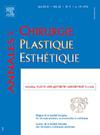Systematic review of free jejunal flap for secondary esophageal reconstruction
IF 0.5
4区 医学
Q4 SURGERY
引用次数: 0
Abstract
Introduction
Esophagus reconstruction could be complicated by leakage, stenosis or graft loss. Salvage surgery may be needed in case of failure of endoscopic treatment or large esophagus defect. Although free jejunal flap is admitted for salvage head and neck reconstruction, few reports assess the results of free jejunal interposition in salvage esophagus reconstruction. We undertook a systematic review whose primary aim is to investigate outcomes of secondary esophageal reconstruction with free jejunal flap in terms of mortality, complications and functional results.
Material and method
We conducted a systematic review of the literature according to the PRISMA 2020 statements searching PubMed and Scopus databases for articles assessing free jejunal flap for secondary reconstruction after failed esophagus reconstruction. References of included studies were also screened. Studies quality was assessed using the JBI Critical Appraisal tools.
Results
562 studies were yielded through databases search and 328 studies were yielded through citations search. 18 articles were included in the systematic review corresponding to a total of 62 patients from 3 to 76 years old. All studies were level of evidence IV case reports or case series. We found that overall mortality was 3.2%, anastomotic fistula rate was 21%, anastomotic stricture rate was 4.8% and graft loss rate was 9.7% with survival of all jejunal regrafts. Solid oral intake was achieved in 93.0% of cases.
Conclusion
Jejunal free flap is a pertinent option for secondary esophageal reconstruction but remains a challenging surgery with high risk of complications that requires multidisciplinary team in large volume/tertiary care hospitals.
Introduction
La reconstruction œsophagienne peut être compliquée de fistule, sténose ou nécrose du conduit. Une chirurgie de reconstruction secondaire peut être nécessaire en cas d’échec du traitement endoscopique ou en cas de large perte de substance. Bien que les lambeaux jéjunaux libres soient admis en chirurgie cervicale secondaire, peu d’études évaluent les résultats des lambeaux jéjunaux libres dans la chirurgie de reconstruction secondaire d’œsophage. Nous avons donc réalisé une revue systématique dont le but principal est d’évaluer les résultats des lambeaux jéjunaux libres en termes de mortalité, de complications et de fonction dans la reconstruction œsophagienne secondaire.
Matériel et méthode
Nous avons réalisé une revue systématique de la littérature selon les principes PRISMA 2020 en recherchant dans les bases de données PubMed et Scopus les études cliniques évaluant les lambeaux jéjunaux libres dans la reconstruction secondaire après échec de chirurgie de reconstruction œsophagienne. Les références bibliographiques des études incluses ont également été passées en revue. La qualité des articles a été évaluée en utilisant le « JBI Critical Appraisal tool ».
Résultats
La recherche dans les bases de données a mis en évidence 562 études et la recherche dans les références bibliographiques a mis en évidence 328 études. Dix-huit articles ont finalement été inclus dans la revue systématique, correspondant à 62 patients âgés de 3 à 76 ans. Toutes les études étaient des revues de cas ou des séries de cas et avaient un niveau d’évidence faible. Nous avons trouvé que la mortalité globale était de 3,2 %, que le taux de fistule était de 21 %, que le taux de sténose anastomotique était de 4,8 % et que le taux de perte du greffon était de 9,7 % dont toutes les reprises par lambeau libre ont montré une survie du greffon. Au total, 93,0 % des patients ont récupéré une alimentation orale solide.
Conclusion
Les lambeaux jéjunaux libres sont une option pertinente pour la reconstruction œsophagienne secondaire mais restent une chirurgie difficile avec un haut risque de complication et requièrent une prise en charge par une équipe multidisciplinaire dans un centre tertiaire.
游离空肠皮瓣用于二次食管重建的系统综述。
食管重建可能会因食管渗漏、狭窄或移植物丢失而复杂化。内窥镜治疗失败或有较大食管缺损时,可行补救性手术。虽然游离空肠瓣被允许用于补救性头颈部重建,但很少有报道评估游离空肠介入在补救性食管重建中的效果。我们进行了一项系统的综述,其主要目的是研究游离空肠瓣二期食管重建在死亡率、并发症和功能结果方面的结果。材料和方法:我们根据PRISMA 2020声明,检索PubMed和Scopus数据库,对评估游离空肠皮瓣用于食管重建失败后的二次重建的文章进行了系统的文献综述。对纳入研究的参考文献也进行筛选。使用JBI关键评估工具评估研究质量。结果:通过数据库检索得到562篇,通过引文检索得到328篇。系统评价纳入18篇文章,共涉及62例患者,年龄从3岁到76岁。所有研究均为IV级证据级病例报告或病例系列。我们发现所有空肠移植物的总死亡率为3.2%,吻合口瘘率为21%,吻合口狭窄率为4.8%,移植物丢失率为9.7%。93.0%的病例实现固体口服摄入。结论:空肠游离皮瓣是二次食管重建的合适选择,但仍是一项具有挑战性的手术,并发症风险高,需要大容量/三级医院的多学科团队。
本文章由计算机程序翻译,如有差异,请以英文原文为准。
求助全文
约1分钟内获得全文
求助全文
来源期刊
CiteScore
1.00
自引率
0.00%
发文量
86
审稿时长
44 days
期刊介绍:
Qu''elle soit réparatrice après un traumatisme, pratiquée à la suite d''une malformation ou motivée par la gêne psychologique dans la vie du patient, la chirurgie plastique et esthétique touche toutes les parties du corps humain et concerne une large communauté de chirurgiens spécialisés.
Organe de la Société française de chirurgie plastique reconstructrice et esthétique, la revue publie 6 fois par an des éditoriaux, des mémoires originaux, des notes techniques, des faits cliniques, des actualités chirurgicales, des revues générales, des notes brèves, des lettres à la rédaction.
Sont également présentés des analyses d''articles et d''ouvrages, des comptes rendus de colloques, des informations professionnelles et un agenda des manifestations de la spécialité.

 求助内容:
求助内容: 应助结果提醒方式:
应助结果提醒方式:


